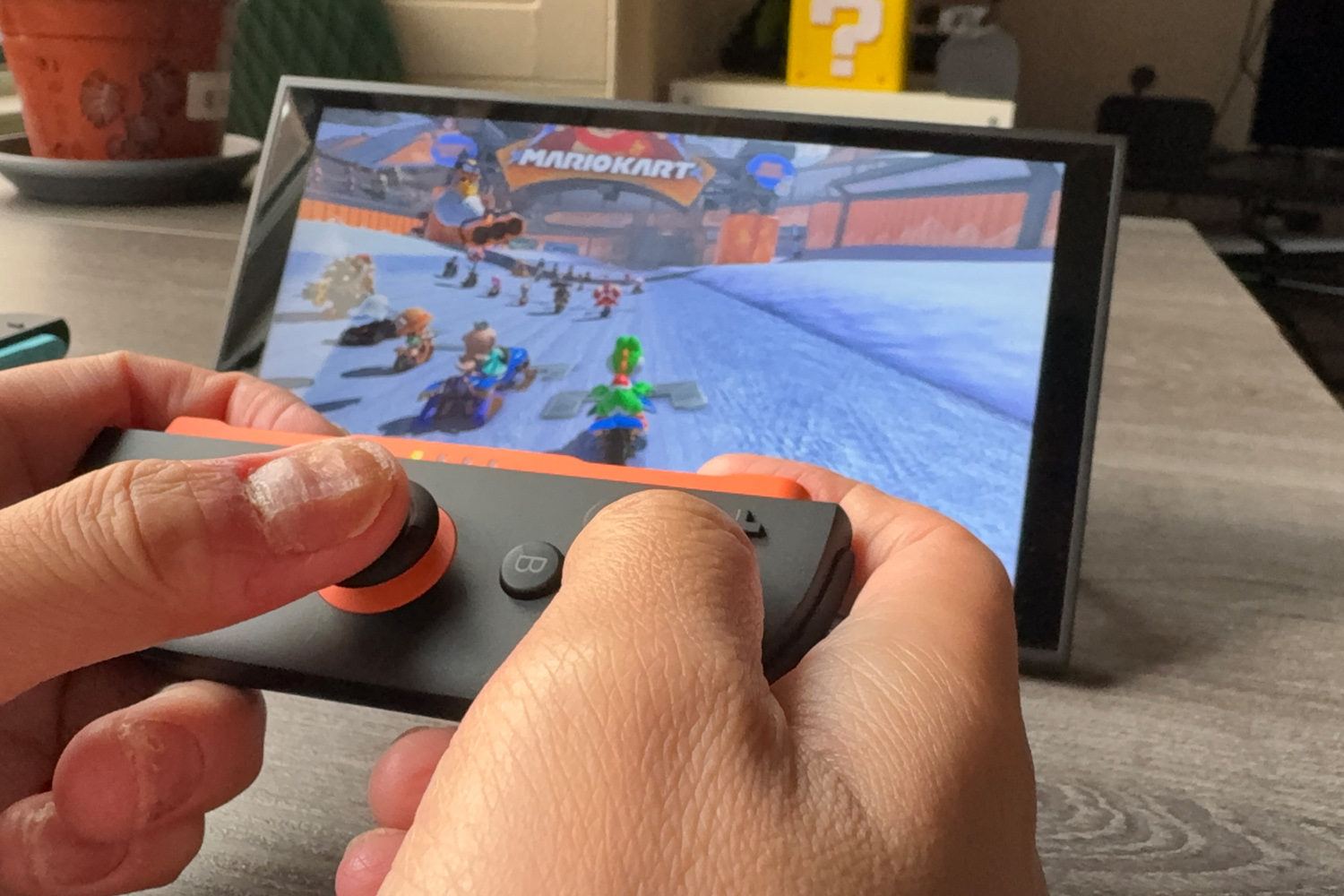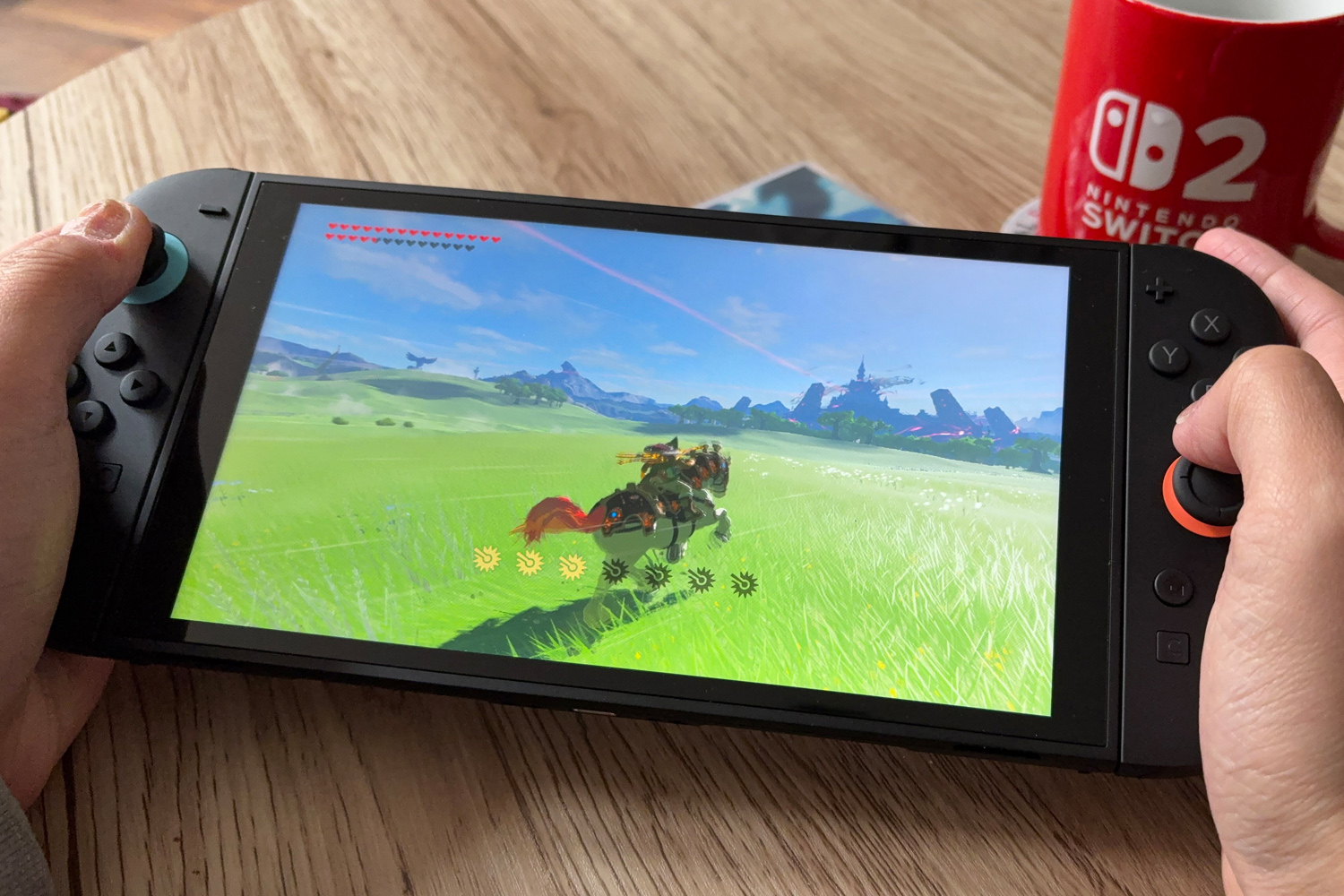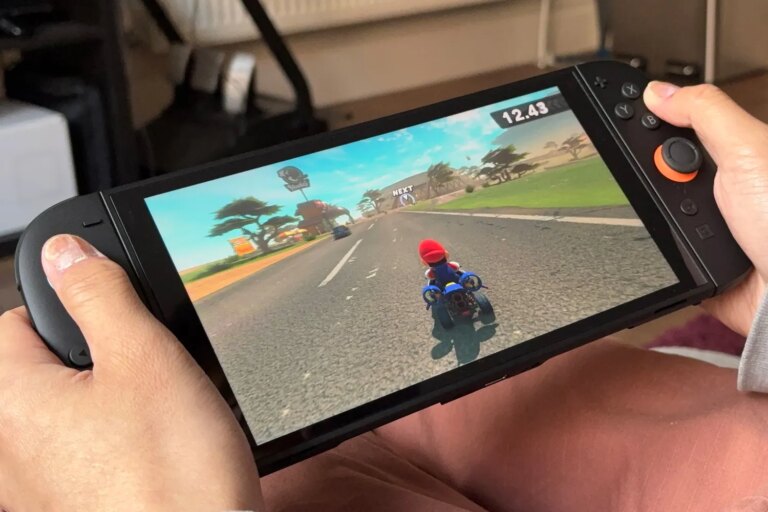Introduction
That Nintendo was in no hurry to replace its first hybrid handheld is hardly a shocker. The original Switch transformed the gaming landscape and went on to be one of the best selling games consoles of all time. But for those of us running out of patience with games that evidently needed a bit more juice (never mind the barely acceptable ports), an update couldn’t come soon enough.
On first inspection an update seems to be exactly what Nintendo has delivered with the Switch 2, to the extent it feels more like an iteration than a truly new generation of console gaming. The Kyoto company’s changing of its long-held ‘lateral thinking with withered technology’ philosophy also makes it the most expensive Nintendo console to date.
The $450/£395 price isn’t just about being able to run better-looking games, though. There really is a lot more going on here than it first appears, which makes it a significant leap of an upgrade.
Design: Smooth hybrid
Without trying to shake up the formula, the Switch 2 follows the same idea of its predecessor: it’s a touchscreen tablet device that offers console-quality games playable on the TV while docked; you can then take it with you on the go in handheld mode, or detach the controllers to play in tabletop mode. New handheld competition including the Steam Deck and Asus ROG Ally might’ve landed in the eight years between Switch generations, but none have delivered this sort of seamless swapping between play modes.
The Switch 2 does what the original Switch does but better. The most significant difference is its size, owing to a much larger 7.9in display compared to both the original Switch’s 6.2in and the OLED’s 7in screens. That also means the Joy-Con controllers that attach to the device are larger than before. It’s naturally heavier at 535 grams, but still lightweight compared to its chunkier rivals, and somehow retaining the same thinness of the first Switch generation.
At the back of the device is a handy stand that’s almost as wide as the console, allowing you to set it up in tabletop mode. It’s much better than the flimsy kickstand of the original Switch. I still think the OLED’s is better; this one is U-shaped with space in between, which makes me worry it might be more prone to wear and tear over time. It’s nonetheless very flexible so you can adjust it at the right angle whether playing at a desk or the fold-out table of a plane. Just like the OLED, you also need to lift the stand in order to reach the slot for inserting extra storage. But with 256GB in the internal storage, you at least have significantly more to start off with.
The dock is also much improved with a cute curvy design, better for reaching the Joy-Con’s release buttons when detaching them without having to take the Switch 2 out first. It also has a fan inside to keep the console cool, which also explains the extra vents. Otherwise, it’s quite similar to the OLED’s dock design, with a removable back flap for reaching the ports. There are also two USB 2.0 ports to the side.
Controllers: do they spark joy?

The Joy-Con’s slight growth spurt is a boon if you found its predecessor’s a bit too small, but the most significant change is that they attach to the console with magnets now. Each satisfyingly snaps into place (the console makes a new sound effect much like the click sound for the original Switch). They genuinely hold sturdy too, detaching by pressing a release button on the back just under the shoulder buttons. Despite some worries on that placement, I never found my finger slipping over to it by accident.
Each Joy-Con can again be turned horizontally to use as a single controller with compatible games, including launch titles Mario Kart World and Survival Kids. The SL and SR buttons also larger than their predecessor’s so the wrist straps don’t include extra bumpers to help you reach them.
What’s new is that each Joy-Con can be turned on its side to function as a mouse. It’s mind-boggling how seamlessly it can switch between modes just by the way you hold it, and if you don’t have a mousemat or table in your living room, it works just as well sliding it on your sofa’s armrest. Or your trousers. Using the wriststrap also makes it a bit smoother to control, though. Despite the novelty, it’s hardly the most comfortable way to hold a mouse if you plan on using it extensively in a game like Civ 7.
While you can use the Joy-Cons to play on the TV by either having them in each of your hands or attached to an included grip, you’ll more likely want to use a proper controller. You don’t necessarily have to fork out on a new Switch 2 pro controller, though. All Switch 1 controllers are compatible, and the pairing process is very straightforward.
Screen and sound: some kind of magic
The lack of an OLED display might feel like a step backward, especially as you just know Nintendo will just release a Switch 2 OLED model a few years down the line as a cynical upgrade. In reality, the 7.9in LCD screen makes up for it in other significant ways. Firstly, its 1080p display means you can finally have full HD portable gaming, but it also has a 120Hz refresh rate – meaning it’s possible to run some games at a smooth 120fps. While this is a feature that’s common in many new smart TVs, if you haven’t upgraded your telly in a while, then this makes handheld play even more appealing.
The Switch 2 also supports HDR, though the benefits don’t feel as pronounced in handheld mode as you do on the TV, where you can better adjust the settings. Revisiting Hyrule in The Legend of Zelda: Tears of the Kingdom or racing through the gorgeous environments of Mario Kart World, that enhanced brightness goes a long way.
Speaking of the big screen, the Switch 2 makes liberal use of Nvidia’s DLSS graphics upscaling tech so that games can output to your TV in 4K. Nintendo has finally caught up with the other major consoles, although in some cases the image might be closer to 1440p. The Switch 2 editions of Breath of the Wild and Tears of the Kingdom still give significantly sharper visuals than the OG Switch.
Just as significant an improvement is audio. The Switch 2 has better speakers that also support virtual surround sound, so you’re not totally reliant on grabbing your headphones for the best audio experience. It also includes a built-in microphone designed to support the console’s GameChat system, which lets you chat with friends by pressing the C button on the right Joy-Con. A camera can also be connected via the USB-C port on top of the device, which does a good job of displaying yourself and your game screen at the same time as if you’re streaming to your friends.
What’s remarkable is that even though the mic is in the system it will still pick up your voice even when you’re sitting on your sofa and you won’t have to yell to be heard. For generations of headset-wearing gamers, this can be strange to adjust to but it really makes voice chat so much easier to do, and there’s even some noise-cancelling wizardry going on where it can suppress other sounds, like a vacuum cleaner or a door buzzer.
Performance and battery life: souped up gaming, at a cost
The original Switch’s hardware often struggled to keep up with gaming’s technological advances, with ‘impossible ports’ praised for simply running at all – even if the frame rates were atrocious. The Switch 2 benefits from substantially more horsepower, courtesy of a custom Nvidia Tegra T239 CPU chip. You could say that it’s on par with a PS4 or, more comparably, a Steam Deck.
They’re not quite accurate comparisons though. Whereas Valve’s handheld can run beefy AAA games at low settings with some extra fiddling, Switch 2 games are developed and optimised specifically for the hardware’s capabilities. Its internals are a combination of last-gen and modern tech, capable of variable refresh rates (VRR), ray tracing (though no game so far supports it), the aforementioned DLSS that improves resolution without sacrificing smooth frame rates, and much faster loading speeds.
The result is this handheld can run Cyberpunk 2077 (a hot mess when it launched on PS4) including its substantial Phantom Liberty expansion. Don’t expect 120fps on the most graphically intense titles, but variable refresh tech means CD Projekt Red’s open world game is very playable at 40fps.
All this comes at a cost, namely to battery life. Despite having a larger 5220mAh battery compared to its predecessor’s 4210mAh, you’re still looking at between 2 and 6.5 hours – so no better. Cyberpunk 2077: Ultimate Edition used up a percent for almost every minute it was running, but even seemingly lo-fi indie game Deltarune saw just under 4.5 hours in handheld mode.
It goes without saying then that if you plan on taking your Switch 2 on long trips that a power bank is essential. At least the extra USB-C port makes charging while playing in tabletop mode much easier. You can also adjust settings so that it’s only charged to around 90% rather than fully charged every time it’s left plugged in, for better long-term battery health. It’s also worth noting that the Switch 2 uses more power and so comes with a 50W AC adaptor – using the 39W AC adaptor from the old model when docked simply will not do.
Game Library: bring it all back
If you’re upgrading from an old Switch, you can transfer your entire user profile over to your Switch 2 – either wirelessly by putting the two devices close to each other or by uploading it to a cloud server that the new console can then receive when first setting up. This process also doesn’t require subscribing to the Nintendo Switch Online service, though it’s recommended since you’ll also have access to GameCube games as part of the Nintendo Classics library. If you plan on holding onto your old console, beware that the new virtual game card system can lock you out of accessing your library of games unless you revert to the old online licensing system, though that still means two people can’t play the same game on the same account at the same time.
But as a sequel console, the best thing is that you can bring your whole Switch 1 library of games with you to Switch 2, and so even if you didn’t buy anything new with the console, you’ll still have a rich back catalogue to dig into. Just don’t redownload all of them at once because that will quickly eat up the 256GB of internal storage, and the new microSD Express cards you have to buy to increase the storage do not come cheap.
Some of these have also been given significant enhancements. Breath of the Wild and Tears of the Kingdom have Switch 2 editions that can be unlocked with a small upgrade price; these don’t just greatly improve the resolution and frame rate and reduce the loading time, but also introduces new functionality with the similarly revamped Nintendo Switch app called Zelda Notes.
In most cases, Switch 1 games have received free updates that make them run better on the new console. The most noticeable is Pokémon Scarlet and Violet, which ran terribly on Switch 1 but now runs in 4K 60FPS. Another bonus is that some Switch 1 games like Super Mario 3D World take advantage of the new GameShare function, which lets you share games with friends either in person or online where only one person needs to own the game, and in most cases even works between Switch 2 and Switch 1 consoles. Even games that haven’t had a dedicated patch like Bayonetta 3 or Hyrule Warriors: Age of Calamity are at least running at a more stable framerate than they did on their original hardware.
It may be strange to be spending so much time talking about older games rather than new ones, but that’s also because the Switch 2’s launch line-up is itself rather thin on genuinely new games. Many are ports, even if they’re no longer compromised or dodgy ‘cloud’ versions, such as Hitman: World of Assassination – Signature Edition, or at best cross-gen releases such as Rune Factory: Guardians of Azuma that you could have bought on Switch 1, even if you will get the better experience on the newer console.
But just like it had done with the original Switch, Nintendo is in no rush to drop everything at once. Mario Kart World is an obvious crowd pleaser to kick things off with, and with Donkey Kong Bananza due next month as well as Metroid Prime 4: Beyond and Pokémon Legends Z-A confirmed for later this year, there’s a healthy cadence of first party releases to look forward to.
Nintendo Switch 2 verdict

Some purists may grumble that an iterative update is very un-Nintendo. But for many, the Switch 2 is quite simply the most premium console Nintendo has ever made, and the beefy yet still lean upgrade we’ve been waiting for.
That premium does of course come at a price, in terms of storage as well as battery life, though this is not unique to the other powerful portables on the market right now. While no price has yet been confirmed for the recently revealed ROG Xbox Ally range, I have a feeling the Switch 2 may wind up feeling like a bargain in comparison.
Not all the new bells and whistles will appeal – GameChat and GameShare are genuine innovations while the mouse function feels too novel and unergonomic – but most of the enhancements do go towards a much better and smoother hybrid gaming experience than before.
Sure, a bigger headliner like a new Mario or Zelda would’ve whet the appetite far more at launch, but this is still just the start of a new generation for Nintendo. And once you have it in your hands, it’s fair to say that its predecessor had a good long run but it’s time to play with power once more.
Read the full article here
